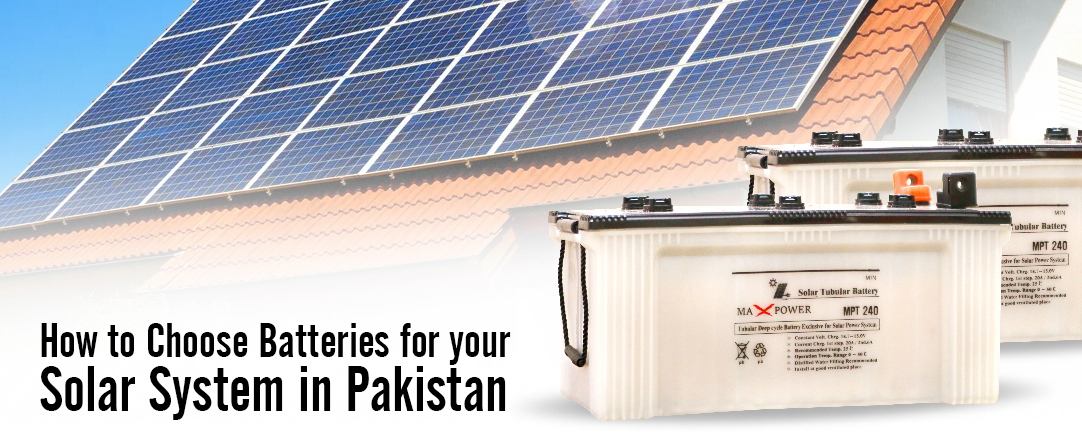
How to Choose the Best Solar Inverter for Your Home in Pakistan
March 2, 2023
MaxPower’s Solar Pump Controller: An Introduction to the Latest Technology
March 25, 2023If you’re considering installing a solar system in Pakistan, it’s important to understand the batteries’ role in the system. Any solar system must have solar batteries since they enable you to store the energy produced by your solar panels for usage when the sun isn’t shining. However, with so many different types of batteries available, it can take time to determine which one best fits your system. In this article, we’ll explore how to choose batteries for your solar system in Pakistan by discussing the following sub-topics:
Types of batteries used in solar systems
Several different types of batteries are commonly used in solar systems, including lead-acid, lithium-ion, and others. Every type has benefits and drawbacks, so the best option for your system will rely on your individual requirements and tastes. Most solar systems employ lead-acid batteries because they are dependable and reasonably priced. However, they require regular maintenance and have a shorter lifespan than other types of batteries. Lithium-ion batteries are more expensive but last longer and require less maintenance.
Battery capacity requirements
The capacity of your solar battery is measured in amp-hours (Ah) and refers to the amount of energy it can store. To determine the battery capacity needed for your solar system, you’ll need to consider factors such as the size of the system, power consumption, and climate conditions in Pakistan. A larger system with higher power consumption will require a larger battery with a higher capacity.
Battery voltage requirements
The voltage of your battery is another critical factor to consider when choosing a battery for your solar system. The voltage of your battery should be compatible with the other components of your solar system, such as your solar panels and inverter. Choosing a battery with the wrong voltage can result in poor performance or even damage your system.
Depth of discharge (DOD)
The depth of discharge (DOD) measures how much energy you can safely remove from your battery before recharging it. The higher the DOD, the more energy you can use from your battery, but it also reduces the battery’s lifespan. Choosing a battery with an appropriate DOD for your system is important to ensure that you’re getting the most out of your battery without reducing its lifespan.
Charging options for batteries
Several different charging options are available for solar batteries, including solar charge controllers, AC chargers, and others. Solar charge controllers are the most common and allow you to regulate the amount of energy going into your battery from your solar panels. AC chargers charge your battery from the grid, which can be useful if you don’t have enough sunlight to charge your battery.
Battery maintenance and monitoring
To ensure that your solar battery is working at its best, it’s essential to maintain and monitor it regularly. Regular inspections and maintenance procedures can help you identify and address any issues with your battery before they become more significant problems. Monitoring your battery’s performance can also help you identify any changes in its performance or lifespan.
Choosing the right battery manufacturer and vendor
Choosing the right battery manufacturer and the vendor is crucial to ensure a high-quality battery that meets your needs. When choosing a manufacturer or vendor for solar batteries, it’s important to consider factors such as quality, warranties, and customer service. Look for a manufacturer with a proven track record of producing high-quality batteries designed to last. You’ll also want to choose a vendor offering a battery warranty, as this can provide added peace of mind if something goes wrong.
Cost considerations
The cost of solar batteries can vary significantly depending on the type of battery you choose and the capacity you need. While it’s important to consider the cost of the battery, it’s also important to balance performance and price when making your decision. Investing in a higher-quality battery may cost more upfront, but it can save you money in the long run by reducing the need for maintenance and replacement.
Environmental factors
The performance and lifespan of solar batteries in Pakistan can be considerably impacted by environmental conditions including temperature and humidity. High temperatures can reduce the lifespan of batteries, while low temperatures can reduce their performance. Humidity can also affect the performance of batteries by causing corrosion and other issues. When choosing a battery for your solar system, it’s important to consider the environmental conditions in your area and choose a battery designed to perform well in those conditions.
Future considerations
The field of solar batteries is constantly evolving, and new technologies and trends are always emerging. When choosing a battery for your solar system in Pakistan, it’s important to consider future trends and technologies that may impact your decision. For example, advancements in battery storage technology may make it more cost-effective to invest in a higher-capacity battery, while new charging options may provide more flexibility in how you charge your battery.
Final Thoughts
In a nutshell, choosing the right battery for your solar system in Pakistan requires careful consideration of a range of factors, including battery type, capacity, voltage, depth of discharge, charging options, maintenance and monitoring, manufacturer and vendor, cost, environmental factors, and future trends. By taking the time to research and evaluate these factors, you can ensure that you choose a battery that meets your needs and provides reliable and efficient energy storage for your home.




